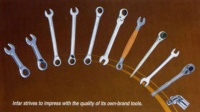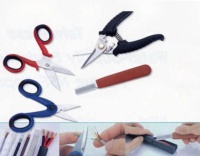Taiwanese Hand Tool Makers Opt for Low Profile in Own-Brand Promotion
Mar 26, 2004 Ι Industry News Ι Hardware & Tools Ι By Willis, CENS
All professional and eight other Taiwanese manufacturers are marketing their products under the common "Ark" brand.
The island's hand-tool industry received a strong boost during the Vietnam War era, when the American military bought tools in large quantities from Taiwan and other Asian economies. Since that time, the domestic industry has worked to improve its quality and concentrate on contract production.
Today this is a major industry in Taiwan, with output expected to increase from NT$80 billion (US$2.3 billion at NT$34:US$1) in 2003 to NT$90 billion (US$2.6 billion) in 2004. There is a growing challenge, however, from low-cost rivals in mainland China.
Professionalism in All Spheres
Some Taiwanese manufacturers are hoping to sidestep this threat by promoting products bearing their own brand names. This development is exemplified by All Professional Mfg. Co., which with eight other domestic tool suppliers has set up a trading company to carry out common marketing under the "Ark" brand name. As this collective effort begins showing results, notes David Huang of All Professional, other local producers are applying to join up.
To avoid areas where contract customers are active, "Ark" brand tools are marketed in Latin America, Southeast Asia, and the Middle East through local agents in those areas.
Huang explains the rationale for own-brand promotion: "If we keep focusing on OEM-based products, we will be in increasingly miserable shape as orders are being switched to firms in the mainland. We hope to find a way to survive by promoting our own brand names in minor markets. We have eight partners, which boosts the exposure of our brand name eightfold. That's our advantage."
A successful brand name must be backed by product and service quality, Huang says, and suggests that local manufacturers of hand tools should distinguish themselves from their mainland Chinese rivals in the market by concentrating on high-end products. It would be senseless, he continues, for Taiwanese producers to compete by cutting prices; instead, they have to keep chasing the frontrunners in the industry to prevent mainland Chinese rivals from catching up with them.
Quality comes from research and development, Huang stresses. He urges domestic manufacturers to develop their own R&D capability so that they can offer high-quality, innovative products instead of just the ability to manufacture on a contract basis. And the development of an R&D capability, he emphasizes, relies on close cooperation among manufacturers, the government, and academic institutions.
Huang also serves as chairman of the Taiwan Hand Tool Manufacturers' Association's (THTMA) pliers committee, and he worries that many local suppliers will fail to identify their product focus and spend money aimlessly on the expansion of their product lines. Huang's own company has obviously not made this mistake; while the island's total exports of pliers in 2002 dropped 8% to NT$1.4 billion (US$43 million), his firm's exports rose by 11%.
"Most domestic manufacturers," Huang explains, "turn out products of all quality levels in the hope of diversifying away from the risks that would result from over-concentration. But they are in great danger of harming their product quality because they have no focus."
He says that high-end products should feature multiple functions, patented design, durability, and smart looks. "That," he says, "is what I've always preached: product differentiation. How can your products catch the attention of consumers at first sight when they're shopping for a pair of pliers in a sea of tools? Differentiation does it-differences in color, design, packaging, and pricing."
While the mainland has a labor-cost advantage, Huang thinks that Taiwanese manufacturers can create an advantageous environment that can partly offset the threat from the mainland. He suggests that, for instance, local manufacturers should emphasize the service aspect of their manufacturing and introduce efficient manufacturing methodologies-which, he believes, can trim labor costs by 10%.
A Name to Trust
One Taiwanese hand-tool maker that has succeeded in establishing its own brand name is Infar Industrial Co., which is reportedly the No. 1 brand in wrenches in South Korea. Chairman Ander Chen attributes the company's success mainly to its early development of that market, and its extremely high-quality manufacturing.
Chen set up Infar in 1978 and entered the South Korean market as a manufacturer for others about 10 years ago, but began promoting his company's own brand name in East Asian markets only four years ago. "Most South Korean manufacturers have focused on making cars, and have neglected light industries such as hand tools," Chen explains. "While they have some suppliers of tools, none of them can compete with their Taiwanese competitors which have been supported for a long time by OEM orders from the West.
"After long-term dedication to OEM and ODM production," he goes on, "our domestic manufacturers have attained the world's best manufacturing quality and have found the best ways to reduce costs. Few manufacturers anywhere else in the world have these advantages."
Chen reports that he began developing his company's own brand to assure the sustainability of his operations. "A brand name, research and development, manufacturing capability, distribution channels, and service are the five critical elements in this," he notes. "If we were to keep our focus on OEM production, we would eventually be forced out of the competition by low-cost suppliers." He has followed the Acer model by separating pure manufacturing from brand-name operations and setting up a company to deal with the marketing of brand-name products.
To avoid causing problems with Western customers that import the company's OEM and ODM products, Infar's branded products are kept within Asia. "The Asian market merits our brand-promotion efforts, because this region has a quarter of the world's gross domestic product (GDP)," Chen comments. "This means that purchasing power here is pretty high, and our brand-name push has a good chance of succeeding."
Only a few of the island's suppliers have succeeded in building up their own brand names, he concedes, because most of them are unable to provide a sufficiently wide range of product specifications and cannot afford sufficient promotion.
Infar has shifted its emphasis to higher-added-value gear wrenches which, Chen notes, have quickly gained popularity since their initial introduction by an American supplier around five years ago. These wrenches feature an ergonomic design with reversibility of direction and minimum strength demands. Infar has won numerous design patents for these wrenches, including those covering the number of ratchet teeth and the angle of the adjustable wrench arm.
Adding Value in Great Amounts
Zipp Tool Ltd. Began promoting its own "Zipp" brand at trade shows in 2003, after serving as a made-to-order air-tool supplier for nearly 20 years. It has opened a facility in the United States to handle its North American business, and another in Southeast Asia to take care of matters in that area. The headquarters in Taiwan handles business in the greater China region.
In its own-brand operations, reports its general manager, George Chu, Zipp has taken steps to alleviate the concerns of its OEM and ODM customers. For example, he explains, "We supply only a few types of name-brand tools, and we never price them low. Nor do we distribute them through agents that are under contract to our customers."
His company, Chu says, started developing innovative products about five years ago in preparation for the move toward own-brand promotion.
The company's brand strategy is to focus on a few items that it excels at, and to distribute them through as many outlets as possible. The current focus is on blind-rivet fastening tools, air saws, air files/lappers, and swivel air inlet joints.
Different sales channels are used in different markets. Overseas, products are moved through agents; at home, the target is car-repair garages. Four overseas agents and more than 20 garages at home have been signed up over the past seven or eight months; next year, Chu expects, own-brand products will bring in a third of his total revenues.
The company has built up a high-quality manufacturing capability over 20 years of experience, and has won the 2000 version of ISO9001 certification from both NSF International Strategic Registrations Ltd. And the United Kingdom Accreditation Service (UKAS).
During the past few years Zipp Tool has also won four patents in the U.S., three in Taiwan, and two in mainland China, including one for a shock-reduction mechanism (which, Chu claims, cuts shock by 50% to 60%) and another for a modularization air tool design (which facilitates large-volume production thanks to standardized parts and permits repairs to be made simply by replacing worn-out modules with new ones available at the company's outlets).
These tools are light because their housing is made of engineering plastic instead of aluminum. Recently, models made of composite materials have also been introduced.
Impressive Quality
Another company that has recently introduced its own-brand products at international trade shows is the Bor Sheng Industrial Co. The firm's aim, however, is to impress buyers with its quality, not its brand. Its own brand is used on only a small number of products for small customers in markets where big buyers do not operate-mostly the U.S. and Europe.
Bor Sheng's primary focus remains on OEM and ODM production. "If we put our own brand names on too many of our products," notes chairman Lin Shih-chieng, "we'd lose orders from our long-term ODM and OEM buyers."
Brand-name promotion is tough for most Taiwanese manufacturers, Lin says, because of the high cost of recruiting trade personnel, gathering information, and deploying retail channels.
Lin started his business around 15 years ago by providing processing services to scissors makers, but in recent years he has shifted his emphasis to designing and producing quality tools. Among its newest products are model BS-504-1 and BS-508 scissors, which are designed for removing the coating on electrical wires and cables. Both models are made of HRC 57-59 stainless steel from Japan, which ensures their durability.
With ergonomic slip-proof handles made of nylon, the pliers help users minimize fatigue during long periods of use. Their denticulate blades are efficient cutters. The two models have won two patents, one for their new design and one for their ergonomic user-friendliness.
The company does its own heat-treatment and grinding to assure quality, and all processing work is done to ISO standards. Monthly production totals 50,000 kitchen cutters, stationery cutters, wire cutters, hair cutters, wallpaper cutters, and carpet cutters.
Lin estimates that the company's business grew by 10% in 2003, despite sluggish procurement in the first quarter due to the SARS epidemic.
©1995-2006 Copyright China Economic News Service All Rights Reserved.









